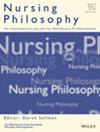从知情同意到授权同意
IF 2.5
3区 医学
Q1 NURSING
引用次数: 0
摘要
知情同意在伦理上是不完整的,应重新定义为授权同意。本文根据知情同意在临床实践中失败的大量证据,对知情同意价值的理论假设提出质疑,并对继续强调自主权作为医疗保健中同意实践的主要伦理理由提出质疑。从护理伦理学的角度出发,将人的尊严而非自主性作为医疗护理中同意实践的首选理由。此外,还重新考虑了义务伦理(即原则主义)作为认识和应对同意实践中持续存在的问题的主要理论视角的适当性。女权赋权框架作为原则主义的另一种伦理理论被采用,并作为一种更实用、更完整的视角来审视医疗保健中的同意概念和背景。为了实现这一目标,本文概述了知情同意的三种主要概念,随后进行了女性主义批判,揭示了每种概念存在的实际问题。我们强烈认为有必要将语言从知情同意转变为授权同意。对临床实践中的同意活动的影响进行了回顾,重点讨论了需要进一步明确所有参与同意的人员的角色--不仅包括病人-医生二人组,还包括病人-医生二人组,因为同意的实践和改进必然是一项跨学科的工作。讨论中还提出了在这一领域利用护理专业知识的具体而实用的建议。也许,在医疗保健中同意的讨论和实践中最需要的是护理。本文章由计算机程序翻译,如有差异,请以英文原文为准。
From informed to empowered consent
Informed consent is ethically incomplete and should be redefined as empowered consent. This essay challenges theoretical assumptions of the value of informed consent in light of substantial evidence of its failure in clinical practice and questions the continued emphasis on autonomy as the primary ethical justification for the practice of consent in health care. Human dignity—rather than autonomy—is advanced from a nursing ethics perspective as a preferred justification for consent practices in health care. The adequacy of an ethic of obligation (namely, principlism) as the dominant theoretical lens for recognising and responding to persistent problems in consent practices is also reconsidered. A feminist empowerment framework is adopted as an alternative ethical theory to principlism and is advanced as a more practical and complete lens for examining the concept and context of consent in health care. To accomplish this, the three leading conceptions of informed consent are overviewed, followed by a feminist critique to reveal practical problems with each of them. The need for a language change from informed to empowered consent is strongly considered. Implications for consent activities in clinical practice are reviewed with focused discussion on the need for greater role clarity for all involved in consent—beyond and inclusive of the patient-physician dyad, as the practice and improvement of consent is necessarily a transdisciplinary endeavour. Specific concrete and practical recommendations for leveraging nursing expertise in this space are presented. Perhaps what is most needed in the discourse and practice of consent in health care is nursing.
求助全文
通过发布文献求助,成功后即可免费获取论文全文。
去求助
来源期刊

Nursing Philosophy
NURSING-
CiteScore
4.80
自引率
9.10%
发文量
39
审稿时长
>12 weeks
期刊介绍:
Nursing Philosophy provides a forum for discussion of philosophical issues in nursing. These focus on questions relating to the nature of nursing and to the phenomena of key relevance to it. For example, any understanding of what nursing is presupposes some conception of just what nurses are trying to do when they nurse. But what are the ends of nursing? Are they to promote health, prevent disease, promote well-being, enhance autonomy, relieve suffering, or some combination of these? How are these ends are to be met? What kind of knowledge is needed in order to nurse? Practical, theoretical, aesthetic, moral, political, ''intuitive'' or some other?
Papers that explore other aspects of philosophical enquiry and analysis of relevance to nursing (and any other healthcare or social care activity) are also welcome and might include, but not be limited to, critical discussions of the work of nurse theorists who have advanced philosophical claims (e.g., Benner, Benner and Wrubel, Carper, Schrok, Watson, Parse and so on) as well as critical engagement with philosophers (e.g., Heidegger, Husserl, Kuhn, Polanyi, Taylor, MacIntyre and so on) whose work informs health care in general and nursing in particular.
 求助内容:
求助内容: 应助结果提醒方式:
应助结果提醒方式:


